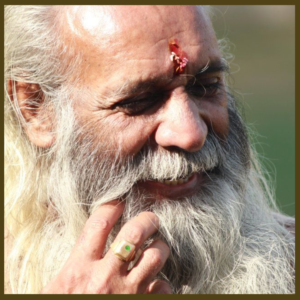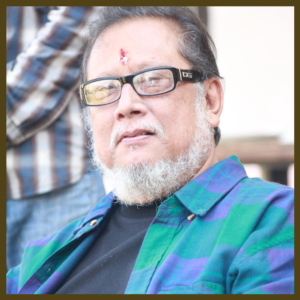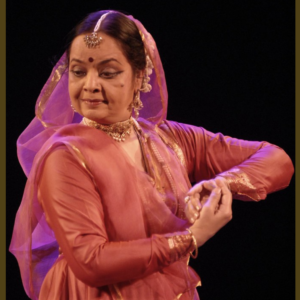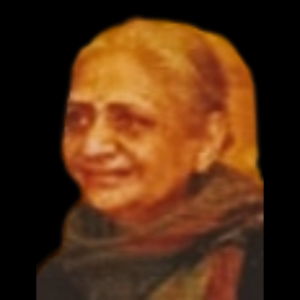Founders of Natyakulam - Theatre By Blind

Shri Bharat Ratna Bhargava Ji
Success is the sum of small efforts, repeated
Shri Bharat Ratna Bhargava is a renowned theatre professional having 40+ years of teaching and writing experience in multiple fields of Theatre, including literature and broadcasting.
He is an established Critic and a recognized scholar on Natyashastra and Indian theatre. He has acted, directed many plays and has translated, adapted numerous Sanskrit and other regional language plays into Hindi.
He has served as a professor (Hindi Literature) in Rajasthan University, Program Executive at All India Radio, Producer of Hindi Programs at B.B.C London and Deputy Secretary (Drama), Sangeet Natak Akademi, New Delhi, India. Recipient of many awards and honors, he is Kulguru at Natyakulam, Jaipur, an institution devoted to training in Indian theatre. At present, he is working with visually impaired children for theatre in Jaipur, India

Shri Kavalam Narayana Panikkar Ji
New life for children, in a new land
Shri Kavalam Narayana Panicker (1 May 1928 – 26 June 2016) was an Indian dramatist, theatre director, and poet. He has written over 26 Malayalam plays, many adapted from classical Sanskrit drama and Shakespeare, notably Kalidasa’s Vikramorvasiyam (1981, 1996), Shakuntalam (1982), Bhasa’s Madhyamavyayogam (1979), Karnabharam (1984, 2001), Uru Bhangam (1988), Swapnavasavadattam, and Dootavakyam (1996). He was the founder – director of a theatre troupe, Sopanam, which led to the foundation of Bhashabharati: Centre for Performing Arts, Training, and Research, in Trivandrum.
He was awarded the Sangeet Natak Akademi Award for Direction in 1983 by Sangeet Natak Akademi, and its highest award for lifetime achievement, the Sangeet Natak Akademi Fellowship in 2002.[5] In 2007, he was awarded the Padma Bhushan in the field of Arts, by the Government of India. He died in his residence on 26 June 2016, aged 88, a few days after returning from the hospital
Kavalam Narayana Panicker ji made Natyakulam, which is an institution where orphans or blind children are educated or raised.

Late Shri Habib Tanvir Ji
A New future for exploited children
Late Shri Habib Tanvir (1 September 1923 – 8 June 2009) was one of the most popular Indian Urdu, and Hindi playwrights, theatre directors, poet, and actors.He was the writer of plays such as Agra Bazar (1954) and Charandas Chor (1975). A pioneer in Urdu and Hindi theatre, he was most known for his work with Chhattisgarhi tribals, at the Naya Theatre, a theatre company he founded in 1959 in Bhopal. He went on to include indigenous performance forms such as nacha, to create not only a new theatrical language but also milestones such as Charandas Chor, Gaon ka Naam Sasural, Mor Naam Damad, and Kamado ka Apna Basant Ritu ka Sapna.
For him, true “theatre of the people” existed in the villages, which he strived to bring to the urban “educated”, employing both folk performers as actors alongside urban actors. He died on 8 June 2009 at Bhopal after a three-week-long illness. Upon his death, he was the last of pioneering actor-managers in Indian theatre, which included Sisir Bhaduri, Utpal Dutt, and Prithviraj Kapoor, and often he managed plays with a mammoth cast, such as Charandas Chor. Habib Tanvir ji made Natyakulam, which is an institution where orphans or blind children are educated or raised.

Shri Ashok Vajypaye Ji
Bringing dreams with in reach for children
Shri Ashok Vajpeyi (born 1941) is an Indian Hindi-language poet, essayist, and literary-cultural critic, apart from being a noted cultural and arts administrator, and a former civil servant.
He was chairman, Lalit Kala Akademi India’s National Academy of Arts, Ministry of Culture, Govt of India, 2008–2011. He has published over 23 poetry, criticism, and art books, and was awarded the Sahitya Akademi Award given by Sahitya Akademi, India’s National Academy of Letters, in 1994 for his poetry collection, Kahin Nahin Wahin. His notable poetry collections include, Shaher Ab Bhi Sambhavana Hai (1966), Tatpurush (1986), Bahuri Akela (1992), Ibarat Se Giri Matrayen, Ummeed ka Doosra Naam (2004), and Vivaksha (2006), besides this he has also published works on literary and art criticism: Filhal, Kuchh Poorvagrah, Samay se Bahar, Kavita ka Galp and Sidhiyan Shuru ho Gayi Hain.
He is generally seen as part of the old Delhi-centric literary-cultural establishment consisting of bureaucrat-poets and academicians like Sitakanta Mahapatra, Keki Daruwalla, J.P.Das, Gopi Chand Narang, Indra Nath Choudhari, and K.Satchidanandan. Ashok Bajpayee ji made Natyakulam, which is an institution where orphans or blind children are educated or raised

Shri Ratan Thiyam Ji
Success is only meaningful and enjoyable if it feels like your own
Shri Ratan Thiyam (born 20 January 1948) is an Indian playwright and theatre director, and the winner of the Sangeet Natak Akademi Award in 1987, one of the leading figures of the “theatre of roots” movement in Indian theatre, which started in the 1970s. Also known as Thiyam Nemai, Ratan Thiyam is known for writing and staging plays that use ancient Indian theatre traditions and forms in a contemporary context. A former painter, and proficient in direction, design, script, and music, Thiyam is often considered one of the leading contemporary theatre gurus.
He worked as Chairperson of the prestigious National School of Drama from 2013-2017. He had also worked as Vice-Chairman of Sangeet Natak Akademi before joining NSD. He also worked as Director of the National School of Drama from 1987 to 1989. He is also the founder-director of Chorus Repertory Theatre, formed on the outskirts of Imphal, Manipur in 1976.[4] He was awarded the Sangeet Natak Akademi Award in Direction in 1987, given by Sangeet Natak Akademi, India’s National Academy for Music, Dance and Drama, and the Padma Shri given by the Government of India in 1989. He was awarded the 2012 Sangeet Natak Akademi. Fellowship, the highest honor in the performing arts conferred by the Sangeet Natak Akademi, India’s National Academy for Music, Dance, and Drama. In the year 2013, Ratan Thiyam receives an honorary D.lit from Assam University, Silchar.

Shri Mukund Lath Ji
If it wasn’t hard, everyone would do it. It’s the hard that makes it great
Shri Mukund Lath was born on 9 October 1937 in Kolkata in the Indian state of West Bengal. After completing his senior Cambridge, Lath graduated (BA Hons) in English literature from the University of Delhi. His master’s degree (MA) was in Sanskrit literature from Jadavpur University in 1965. Later he enrolled at the Institute for Comparative Music Studies and Documentation, West Berlin for research on Dattilam, an ancient treatise on the music of India.
Subsequently, he returned to India and secured a doctoral degree (Ph.D.) in Dattilam from Delhi University in 1976. He also had training in classical music, during a period from 1966 to 1968, under Pandit Maniram and Ramesh Chakravarti, and later, had training in the genre of Khayal Mewat Gharana under the guidance of Pandit Jasraj, whom he accompanied on many concert tours.
Lath started his career at the University of Rajasthan by joining their Department of History and Indian Culture in 1973 where he worked till his retirement in 1997

Km. Prerana Shrimali Ji
You don’t have to be great to start, but you have to start to be great.
Km. Prerana Shrimali is a senior dancer of Jaipur Gharana of Kathak. Born in Banswara in Rajasthan, Shrimati Prerana Shrimali was initiated in Kathak dance by Guru Shri Kundan lal Gangani in Jaipur.
Later, she was groomed in the art at Kathak Kendra, New Delhi, under the same Guru late Shri Kundan Lal Gangani of the Jaipur gharana. She has also choreographed several productions and has participated in several international dance seminars and conferences. She has also imparted training to young dancers at Gandharva Mahavidyalaya and Shriram Bharatiya Kala Kendra.
She has served as Repertory Chief of the Kathak Kendra, Delhi from the year 2007 to 2009, and later served as a senior guru in Kathak kendra Delhi from 2012 to2017.
Shrimati Prerna Shrimali has been awarded the Rajasthan Sangeet Natak Akademi Award and the Rashtriya Ekta Award of the Rajiv Gandhi Foundation. Her dance has been featured in the film The Far Pavilions produced by BBC.
Shrimati Prerana Shrimali was awarded central Sangeet Natak Akademi Award for the year 2009 by the president of India for her contribution to Kathak dance. Now she is based in Jaipur, Rajasthan and started her own institute ‘KALAAVART’ Prerana Shrimali centre of Kathak in 2021.

Prof. Kamlesh Datt Tripati Ji
Pain is temporary. Quitting lasts forever
Prof. Kamlesh Dutt Tripathi is an Indian theatre personality and professor emeritus of BHU Varanasi. His interest and expertise spread from Kutiyattam tradition to Ankiya Nat of Assam, aesthetics. He has contributed to the contemporary practice of classical Sanskrit texts in his tenure as the Chairman of Kalidasa Academy Ujjain.
He had associated with Natyasastra scholar and Kutiyattam actor Natyacharya Mani Madhava Chakyar. He was instrumental in understanding and performing the plays by Kalidasa and Bhasa. His writings and translations into Hindi of plays like Balacharita were important in understanding the dramaturgy of Bhasa in the modern context.
Kamlesh Dutt Tripathi Ji made Natyakulam, which is an institution where orphans or blind children are educated or raised.

Smt. Usha Malik Ji
Opportunities don't happen, they are created
Smt. Usha Malik, former secretary of Sangeet Natak Academi, New Delhi and renowned scholar. Her contribution as Secretary is considered to be the Golden period for the support to performing art and the artists.














